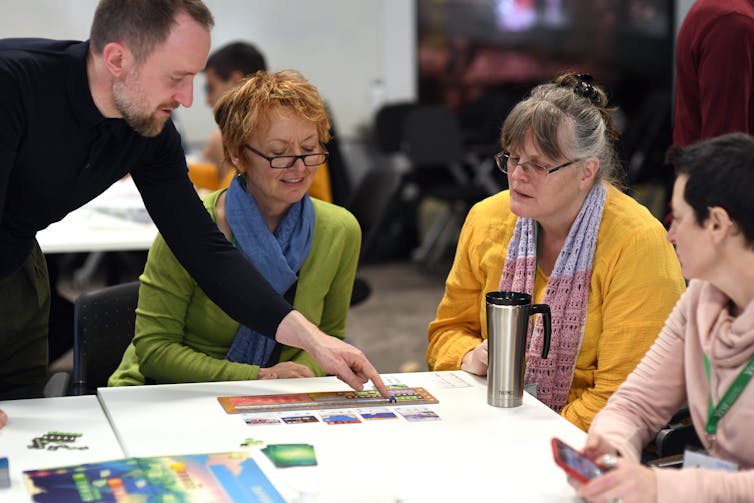
Although most people in the UK are worried about climate change, disagreement about what to do can be polarising, especially at Christmas when norms around travel, presents and waste are at the forefront of people’s attention. People who are concerned about climate change and environmental sustainability can feel separated from family and friends who don’t want to engage in difficult conversations. We think games can help.
Research on game design and climate action shows that games could be a playful way to stimulate non-threatening conversations that make sense of climate change, promote learning and engage the imagination. Games could point to social, political and economic responses while highlighting the importance of urgent action.
During a game, all players are part of what Dutch historian and author of Homo Ludens: A Study of the Play-Element in Culture (1938), called a “magic circle” – they can be anything or do anything as long as they abide by the rules of play, so it’s a powerful way to explore new possibilities or imagine alternative futures without any pressure.
Here are five games that can stimulate conversations about climate change this holiday.
1. For wannabe mayors
Carbon City Zero is a board game that can be played competitively, collaboratively or solo. It challenges players to use their available resources to build a zero carbon city before time runs out. Players buy and trade cards representing government, industry and public actions. To make a more sustainable city, players must overcome challenges such as funding cuts, public apathy and opposition, greenwashing and global recession. In the competitive version, the first player to get their carbon emissions to zero wins.
2. For bored relatives
Cranky Uncle is a great way to amuse family members who need some screen time this festive season. This free-to-download app “gamifies” the science of misinformation and climate denial. It draws attention to how fake experts, logical fallacies, impossible expectations of proof, cherry picking evidence and conspiracy theories work together to undermine climate facts. Humour is used to help players spot misinformation and avoid manipulative communication.

3. For all-night players
Daybreak is a collaborative game about stopping climate change where everyone succeeds or fails together. Acting on behalf of a bloc of countries, winning is achieved by collectively being able to mitigate and adapt to climate change and keeping temperature rises down to avoid crises.
Players do this by reducing emissions, protecting carbon sinks (oceans, rainforests) and building social, ecological and infrastructure resilience. This game doesn’t shy away from the effects of climate change and the urgent need for action, but it also presents solutions inspired by Project Drawdown, with QR codes linking to information beyond the game.
4. For storymakers
Climate Dice encourages players to create stories related to climate change and climate action. Players simply roll wooden dice with a picture on each face. The 42 different images, such as a car, footprint or bird, provide visual prompts on themes such as nature, wildlife, crises, transport and actions. The catch is that the stories must have happy endings.
This game can be played by any number of people. It can be completed within a few minutes or be used as a tool to build more complex stories over longer periods of time. Climate dice approaches climate change as a challenge to conquer collectively in the stories they build than merely a problem to be solved.
5. For strategists
CATAN: New Energies is a competitive board game focusing on the transition from fossil fuels to renewables in the context of building new towns and cities.
Players accumulate and trade resources, using them to build new cities. Players start with cheap fossil fuels that cause pollution, but as they invest more in renewable energy, there are rewards for sustainable strategies. If pollution levels stay high for too long, the game will end in catastrophe, and the player who invested most in renewable energy will win.
Winners are the players who create sustainable development and clean up pollution, so this game can provoke out-of-game questions about green growth (the idea that economic growth can be environmentally sustainable) and the challenges associated with the energy transition.

While settlement, resource extraction and trading are foundational to Catan, some other game designers are drawing attention to the links between justice, colonialism, extractive industries and economics that drive climate change and intensify global inequalities. For example, a game called Navaroud is currently being developed by game designer Anukriti Gupta to do just this. It is inherently unfair. Based on the history of colonisation in India, Navaroud will enable players to explore what fairer international policies might involve.
Climate action means imagining what a new world could or should look like, and behaving with intention to create more sustainable and fairer ways of living and being. Climate change games offer an interactive way to inform, tackle misinformation, explore alternative climate action, experience their consequences and envision a better future while having fun.
Games help us discuss ideas, questions, dilemmas, confusion and come to new understandings through non-confrontational conversations. They enable us to imagine a better world with family and friends, while highlighting the collective actions most needed to tackle climate change.

Don’t have time to read about climate change as much as you’d like?
Get a weekly roundup in your inbox instead. Every Wednesday, The Conversation’s environment editor writes Imagine, a short email that goes a little deeper into just one climate issue. Join the 40,000+ readers who’ve subscribed so far.
Lynda Dunlop has received funding from the Economic and Social Research Council, the Education Endowment Foundation, British Educational Research Association, the Engineering and Physical Sciences Research Council, the Templeton World Charity Foundation and UK Research and Innovation.
Prasad Sandbhor receives funding from the EPSRC Centre for Doctoral Training in Intelligent Games and Game Intelligence (iGGi) for his PhD research on designing role-playing games for sensemaking of climate actions and from the High-Value Manufacturing Catapult-funded University of Sheffield Advanced Manufacturing Research Centre (AMRC) for the Knowledge Exchange project wherein he has designed 'Future Factory' game for envisioning sustainable futures of manufacturing.
This article was originally published on The Conversation. Read the original article.





